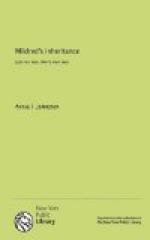Easter had always come to Mildred with the freshness of country meadows, with cowslips and crocuses, with the soft green of budding hedgerows and a chorus of twittering bird-calls in the old rectory garden. This year, after her long, dreary winter in Carlsville, she looked out on the roofs of the smoky little manufacturing town, and saw only red brick factories and dingy houses and dirty streets. The longing for the spring in her old English home lay in her heart like a throbbing pain. “Oh, papa,” she sobbed, resting her arms on the window-sill and laying her head wearily down, “do you know all about it, dearest? Oh, if you could only tell me what to do!”
A week before, her aunt, Belle Barnard, had said, in her sickly, complaining voice, “Well, Mildred, I don’t like to tell you, but I have been talking the matter over with the girls, and they think that we might as well be plain-spoken with you. Everybody thought that your Uncle Joe was a rich man, and so did we till we got the business settled up. Now we find that after the lawyers are paid there won’t be enough for us all to live on comfortably. At least there wouldn’t be if it wasn’t for a small inheritance that Maud and Blanche have from their grandmother, and, of course, they couldn’t be expected to divide that with you, and deny themselves every comfort; so I don’t see any help for it but for you to get a place in some store or millinery shop, or something. We have to move in a smaller house next week.”
The week had nearly gone by, and Mildred was growing desperate. Unfitted for most work, either in strength or education, she scarcely knew for what to apply, and went from one place to another at her aunt’s recommendation, feeling like a forlorn little waif for whom there was no place anywhere in the world.
One afternoon she sat by her window, looking out on the early April sunshine, trying, with the hopelessness of despair, to form some plan for her future. “Why didn’t I have a grandmother to leave me an inheritance like Blanche and Maud?” she thought, bitterly.
Then her thoughts flew back to the day on shipboard, when she had heard of the old house in Chester and the inscription in her companion’s wedding-ring. “And she told me to take that motto for my own,” she whispered through her tears. “‘God’s providence is mine inheritance!’ If it is, the time has certainly come for me to claim it, for I have never been in such desperate need.”
The few times that winter that Mildred had gone to any service, had been in the church in the next block. Its gray stone walls, with masses of overhanging ivy, reminded her of the one she had loved at home. God had seemed so very far away since she came to Carlsville. She prayed as she had always done before, but her prayers seemed like helpless little birds, unable to rise high enough to carry her pleadings to the ear of the great Creator who had so many cries constantly going up to him. She had not realized




